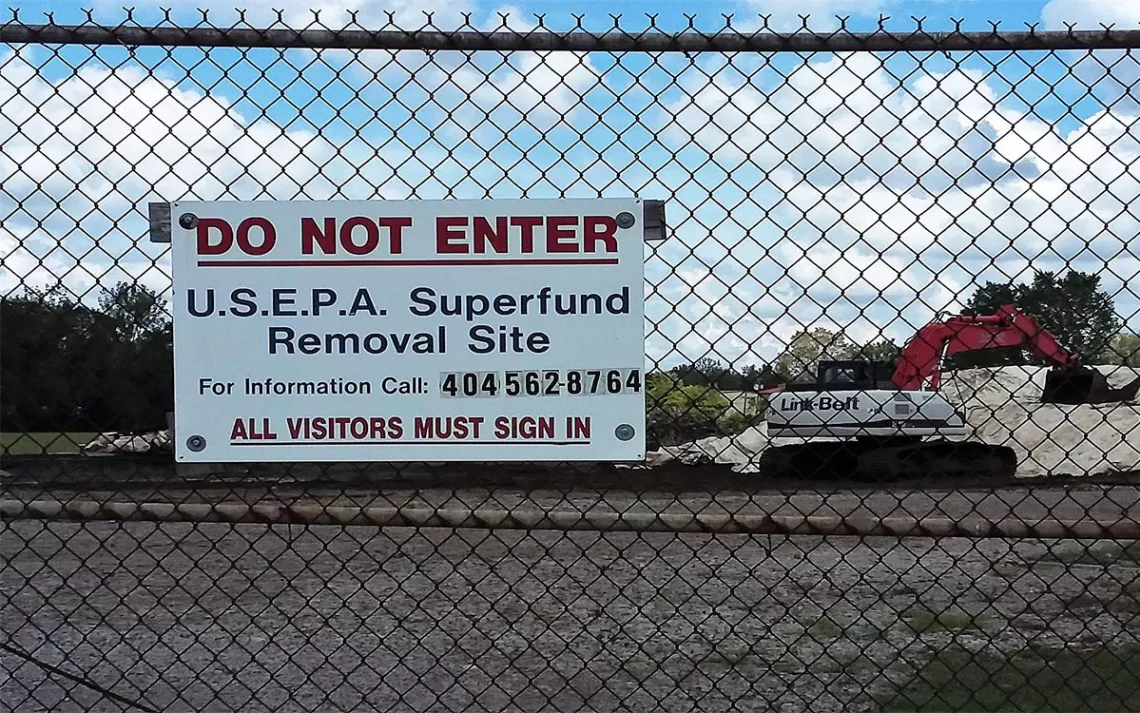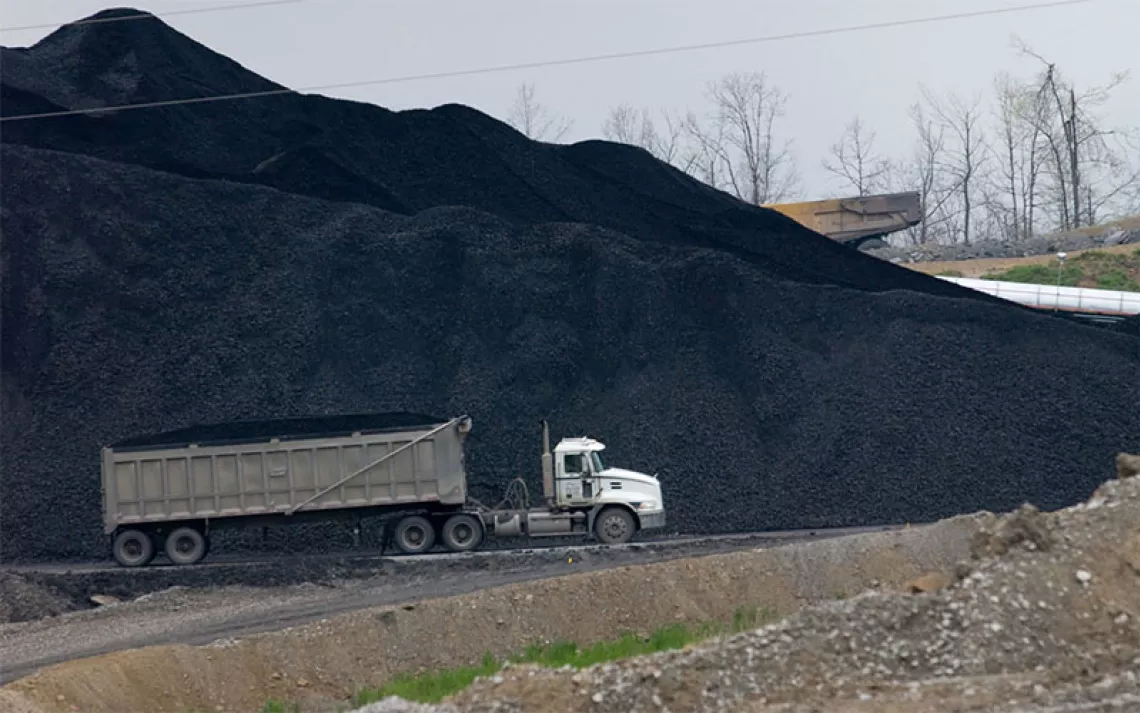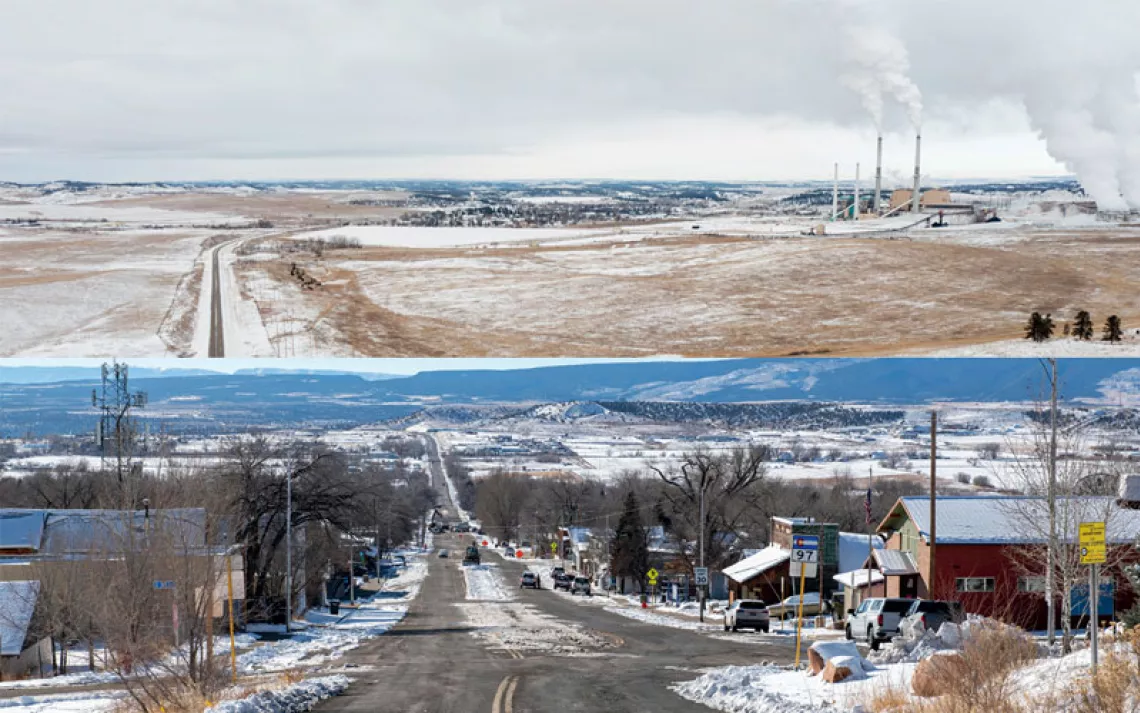Superfund Scandal Leads to Prison Time for Coal Lobbyist, Lawyer
Birmingham coal lobbyist and lawyer were convicted of bribing state official

Photo by Matt Smith
An ex-Alabama coal company lobbyist and a former lawyer for one of the state’s biggest law firms are headed to prison for a bribery scheme surrounding a Superfund site in Birmingham.
A federal judge Tuesday sentenced David Roberson to two and a half years in prison and Joel Gilbert to five years for bribing a state lawmaker who represented neighborhoods on the north side of Birmingham, where a century of emissions from the city’s steel industry have left yards laced with heavy metals and toxic coal byproducts.
Roberson was the vice president for regulatory affairs at the Drummond Company, which owns a plant that turns coal into coke to fuel the mills. Gilbert was a partner at the Southeastern powerhouse firm Balch and Bingham, which represented Drummond. The sentences came three months after a jury found them guilty of funneling about $375,000 to then-state representative Oliver Robinson to oppose the expansion of the Superfund site, which could have left Drummond on the hook for millions of dollars in cleanup costs.
Robinson, a five-term Democrat who pleaded guilty in 2017, testified against Roberson and Gilbert and has been sentenced to 33 months in prison. Roberson and Gilbert have maintained their innocence and appealed their convictions, with Roberson blaming Gilbert and his firm for bad advice.
“I never agreed to bribe Oliver Robinson,” Roberson told U.S. District Judge Abdul Kallon at Tuesday’s sentencing hearing. “I never thought we were bribing Oliver Robinson. Joel was the lead on the work with Balch and Bingham. I trusted him and deferred to his judgment.”
But George Martin, the assistant U.S. attorney who prosecuted the case, told Judge Kallon that Roberson had raised that argument with the jury, which didn’t buy it. Roberson may be “a good person who made a bad decision,” but he was also an experienced lobbyist.
“He knew what was right and wrong, and he had the last best chance to stop what he knew was wrong,” Martin said.
Gilbert denied any wrongdoing or that his actions endangered the health of anyone in the north Birmingham neighborhoods. In court papers, his lawyers argued that his conduct “was at worst a dark anomaly in an otherwise extraordinary life that has brought light to others.” But prosecutors sought a stiffer sentence for the attorney because he “dishonored our shared profession” and damaged his firm, his client, and the public.
Kallon said he was “blown away” by the parade of witnesses that attested to Roberson’s character, particularly his involvement in caring for his autistic teenage son. But while he agreed with prosecutors that Roberson was less to blame than Gilbert, “There’s no doubt that the crimes in this case are serious crimes.”
In addition to prison time, both men were fined $25,000. Charges against a second member of Gilbert’s firm, Steven McKinney, were dropped midway through the trial.
The Environmental Protection Agency is in the process of scraping up the dirt from hundreds of contaminated yards in north Birmingham. But it eventually decided against expanding the cleanup or adding the area to the National Priorities List, which would allow regulators to clean up the site first and seek repayment from responsible parties later.
In the wake of the corruption case, a new mayor has asked the agency to revisit that decision.
“Apparently, this plot against the people of Birmingham worked,” Mayor Randall Woodfin, who ousted incumbent William Bell in 2017, wrote to the EPA in August. But after the revelations the bribery case brought to light, “we believe this situation demands a much more robust response.”
The trial also has led to the suspension of the head of Birmingham’s NAACP chapter, Hezekiah Jackson, after testimony that he took money to urge people not to get their property tested for contamination. Jackson has denied wrongdoing, but Charlie Powell, a north Birmingham homeowner, said the case has left residents feeling abandoned.
“We are the forgotten neighborhood, the forgotten community,” said Powell, the founder of People Against Neighborhood Industrial Contamination, or PANIC. Powell tried to attend Tuesday’s hearing, but found himself stuck outside of the packed courtroom.
“These guys have bamboozled us,” he said. “And all they got was three years, two years, or five years.” But he added, “There’s more that’s involved in this.”
Martin wouldn’t comment when asked whether the investigation was still active.
The four Birmingham neighborhoods involved in the cleanup are sandwiched between two coke plants, which superheat coal in an oxygen-free environment to produce the carbon-rich fuel needed in blast furnaces. During the era of segregation, discriminatory housing rules forced many African Americans to live in the shadow of those plants and some of the nearby steel mills they serve.
Those facilities left the neighborhood soil laced with lead, arsenic, and benzo(a)pyrene, a coal byproduct that causes cancer, at levels that posed elevated risks to human health—especially for children, who play in or eat dirt. Gilbert argued that there was no evidence anyone has gotten sick, but PANIC and the local environmental group GASP say more detailed studies are needed to investigate residents’ complaints about the incidence of diseases like cancer and asthma.
In 2013, the EPA declared more than 1,000 acres a Superfund site and named five companies, including Drummond, as potentially responsible for the pollution and cleanup costs. In 2014, GASP asked the EPA to expand the site into another neighborhood and the small suburb of Tarrant, where Drummond’s plant is located.
Gilbert and Roberson were convicted of routing money to Robinson to fight that plan, using a consulting contract between a nonprofit foundation they set up and a nonprofit education organization Robinson had established. In return, Robinson pressed Drummond’s case in meetings with the EPA and its state counterpart, the Alabama Department of Environmental Management.
He urged ADEM to limit the scope of the cleanup and voted for a Gilbert-penned resolution in the state House of Representatives opposing the expanded cleanup. Robinson, a onetime local basketball standout who played a year in the NBA, kept those financial ties under wraps in the process.
Michael Hansen, GASP’s executive director, said he thought the sentences for Gilbert and Roberson sounded fair, “though I do think the fine ought to have been more for both of them.”
“I have had a hard time rooting for either of them to get lengthy prison sentences, to be honest,” he said. But he said their sentences could have included some form of restitution to a community group like PANIC.
 The Magazine of The Sierra Club
The Magazine of The Sierra Club



